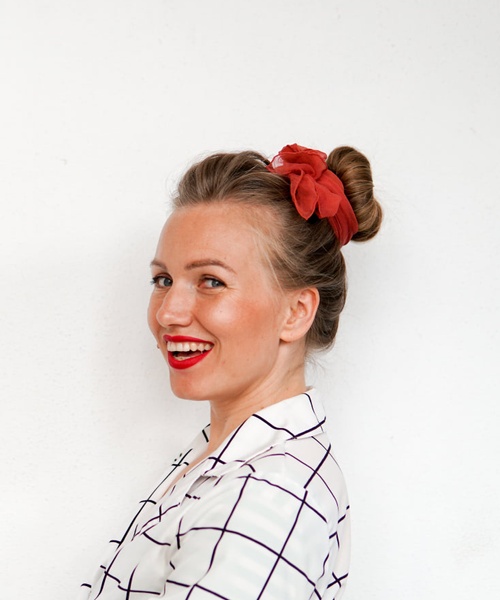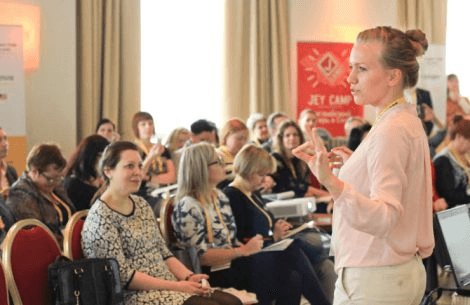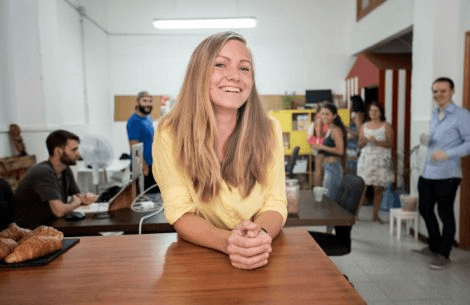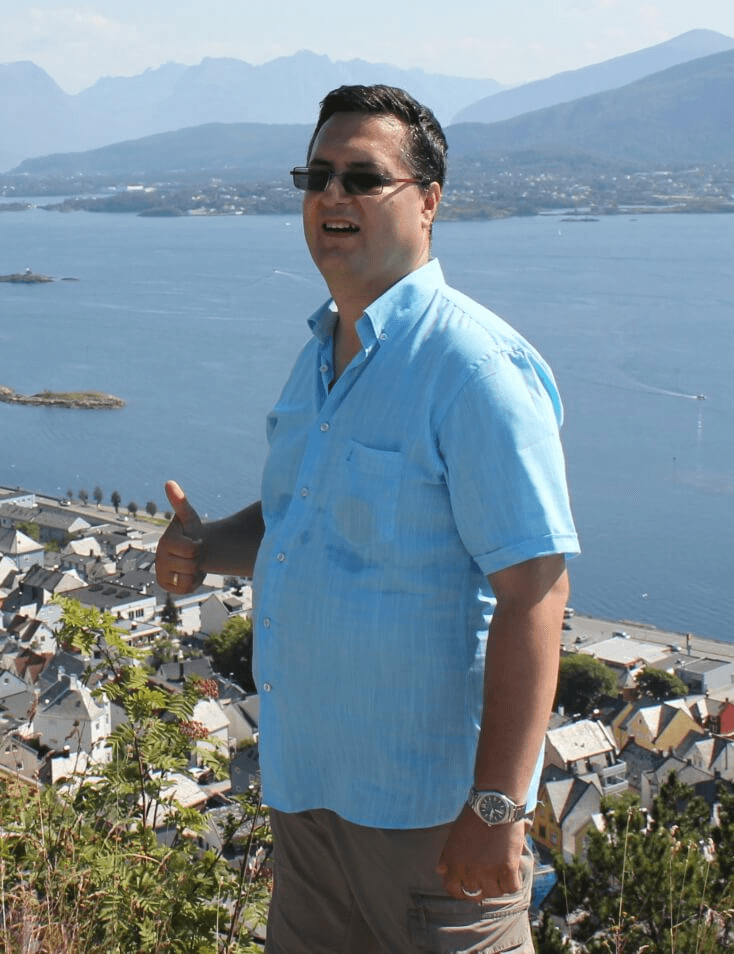
Maria Sirotkina
My name is Maria. I'm currently based in Lisbon, but I was born in the middle of nowhere in Russia and moved for my studies into Moscow. I studied International Journalism, and I started my first company off campus with my college friends. We built it into a somewhat serious business, so it was kind of your classic story when you don't know what you're doing, but somehow it turns out working properly. Years later, after graduating from IE, I had a bunch of other entrepreneurial adventures in the hospitality, travel, and education sectors, and I've worked a lot as a consultant as well, and I'm now actively building my 3D Arts Academy, where we train digital artists. I also work with start-ups on the side to help people get funded. My specialty in business is growth and operations.
"Ideas are free. Execution is core."
Q&A WITH MARIA
Define your experience in the IMBA in one word.
Flow. Because you start with no expectations, or at least I started with no expectations, and then you get carried off with life at ie. You go to all these different events, you need all this people, you go to lectures that help you kickstart conversations, and you don’t even know where this flow is going to take you. But eventually, somehow it works. And you end up being a totally new person with all this transformation that you don’t even realize you’re going through.
Why did you choose to study this program at IE?
For me, IE was a choice of location, because I wanted to be in the city. I didn’t want to be off the grid, like on campus isolated in the middle of nowhere. I like big cities. And I love Madrid, but I’ve never had the experience of living in Madrid before. So that was something I was looking forward to, and besides I knew IE was one of the best schools in Europe, and if you can choose, shoot for the best! For me, the logics of going to highly ranked schools is that I want to be surrounded by other ambitious people, and that’s just the easiest filter, ambitious people go to ambitious schools.
How did your experience at IE prepare you for your professional career? In what ways do you think the program has changed your life professionally and personally?
My initial goal was to go into consulting. I wanted to maybe be involved with some bigger projects, and I thought I was going to get a job and I didn’t have anything on my CV that could validate me. So, I thought “I’m going to go to a great school, and I’m going to work on my skills, my experience, and I’m going to prepare myself for the next career loop.” But then, when I graduated, I realized that I didn’t really want to do that with my life. But still, there’s a lot of things that I could apply in business, really. There’re hard skills, like numbers and the way big boys look at the business, like reading a spreadsheet, you know how to do that now, right? So, this is important. But, on the other hand, I think it really helps you think bigger, learn things about investment, and where you can be going when you’re starting a company. That was pretty valuable for me, as was learning from my peers about all the different industries, outside-of-classroom conversations where you get to talk about all this, and also how people build their careers, what are the different paths you can take. Just learning about all these opportunities, and what exists in the world beyond your bubble, is really valuable, I think.
What is your favorite memory from your time at IE?
The top favorite memory would be one outside the classroom. Every country would organize their national party, like the Colombian party and the Mexican party, and everybody was really looking forward to these parties because of all the food and drinks. When we organized a Russian party back in the day we rehearsed a dance, and we brought a ballet group. Rehearsing the dance and enjoying all these national customs was a lot of fun. It was almost like a summer camp experience. It has nothing to do with spreadsheets, but we’ve definitely created the memory, and we all got to participate in these crazy pictures in national costumes. So just celebrating this, this union based on culture, and by that time I had been already living outside of my country for many years. So that was really cool, you end up bonding with a lot of people through activities like these, and it doesn’t sound serious, but you build some serious relationships through them.
Of all the different cultures and nationalities you share your time with, what was the one that surprised you the most?
Studying at IE I really understood the tiny bits of differences between all the Spanish speaking cultures. For me, it was “they are the Spaniards.” That would be me first day at IE going through the door. “There are the Spaniards, and then the rest of us.” But then, little by little, you start dissecting, “these aren’t just Spaniards. There’s people from Peru, or Chile, and they’re absolutely different!” There was not one that particularly surprised me, but I think that what was surprising were all those differences. And when you start relating to people you understand more about them, just from conversations. The fact that these differences exist, and how each country’s politics impacts opportunities for different people… I think that was kind of surprising, and I think I learnt a lot from that.
What is the one thing you wish you knew when you were a student?
I wish I knew that all the fun stuff would be as useful for me as the academic stuff. I wish I had gone to even more of these fun activities and completely trusted the process. At some point I was skipping the fun part because I thought it was better just to concentrate on the academic. I regret now skipping that, I would definitely have done more, and I wouldn’t consider this as downtime, you know. It’s still part of the learning process, although maybe it doesn’t seem so.
Are entrepreneurs born or made?
Absolutely made. I’m still in touch with a lot of my peers from IE and I know there’s a lot of people that are planning to transition into entrepreneurship at some point, or people that are working on their side hustles, and so they’re building themselves up, and this is totally legit. Entrepreneurs don’t have age, it’s not like if you started late, you’re late. You can be an entrepreneur and work a regular job.
It’s not like anyone is born into something, I really do not believe all this crap about talent, because you build your own talent, whether it be entrepreneurship or playing the guitar, you just have to practice or have interest, once you have an interest that’s the foundation of your talent. And if you read books, or do trial and error, or immerse yourself in the community that you’re interested in, then you will make it. So, absolutely made. And there’s a bunch of successful entrepreneurs that became those because of some difficult situations that they’ve been through, or because there was no other option, or they were forced into it, and eventually they succeeded. On the other hand, there’s a lot of “junior entrepreneurs” that we never get to hear about again.
You don’t really have to be a career entrepreneur; it can just be one of the paths. You try that, it works out or maybe not, and then you get a job, which is also fine. You build yourself up and then you go again. These days, people change careers quite frequently, it’s totally fine when one of your careers is entrepreneurship, but you also do a lot of other things.
Why do you urge entrepreneurs in general to open a bakery?
That was my first Ted talk, and I still stand by it, partially. Because to me opening a bakery is making an attempt, giving it a try. First, you need to take it out of your system if you really have this idea. But, on the other hand, the “opening a bakery” is a concept of a business-led lifestyle. You don’t have to make 10 million a year to be successful. For me, the concept of a business lifestyle is when you design your life, and prioritize your interests, your family, and have a business that supports that. Nowadays, however, with all other industries experience, I know that a bakery is a horrible idea, it’s probably the worst business you could have. So, probably you know, the 2022-2023 version of it is… I don’t know, open an agency.
But you know? A bakery sounds sexy. So, let’s keep it as bakery.
In your TED Talk you also mention that you don’t need to have the most unique or original idea to open a business.
Absolutely. That’s another thing. You absolutely do not need a ground-breaking innovation to actually build a business on top of that. What you actually need is the desire and the drive, and just believing that it’s going to work because it will work. People buy and sell things all the time. Gymshark became a unicorn of sports apparel. It’s as simple as that, who needs leggings? Everyone! That’s it.
Is it more important to have a terrific business idea or having terrific project execution?
Execution 100%. Ideas are great and we need innovation. There has to be a great idea, but also great timing and great execution. There is this common thread of thought that you need great marketing and great UX, too. So, we better think as camels, not as unicorns: building the core of your business, a solid business model that will carry you for years, rather than a spark of a great idea that will maybe inspire your investors and your initial customers, but then, chances are you’re not going to make it. And you’re going to drop it because it’s just not going to get enough traction. Ideas are free. Execution is core. And there are very few people that are ready to take it all and actually become that manager that is able to build that business.
What advice can you give to entrepreneurs looking for their first rounds of investment?
I’d say, and I say this to all the start-ups that I work with, bootstrap for as long as you can. First, it will give you a lot more money in the long run, for you will have preserved a lot more equity. And second, at some point you might realize that you don’t need funding at all. This is the ideal situation, like what happened with Mailchimp, that was recently acquired by Intuit by… I can’t even remember how many billions. They’re a great example that that will do. Right now we’re in an economic downturn and investment is scarce. It’s also just thinking of it as an opportunity to preserve your equity and really think of the business model, how we can make this work, because the goal of the business is not to take investment, the goal of the business is to actually make money.
So, before you try to raise a round think if you really need the funding. For some entrepreneurs, it makes sense to get a job and financing the startup themselves. You do your day job, reinvest as much as you can, hire contractors here and there… A lot of the founders that I know would just bootstrap, because why would you give away ownership?
How important is it for you to own a business that’s purpose-driven and that makes a positive impact in the community?
I think the majority of the businesses out there are making an impact just by the simple fact that they exist and they provide services. A business is a service. People are using your goods and services. That’s a good indicator. But besides that, it’s important to respect your team by paying them good wages and respecting their families by giving your team enough flexibility. This is another way of having a positive impact. Obviously, reinvesting in your employees with training programs is also another way of adding positive impact.
We don’t even need to think that far. Currently, my team is relatively small, and I like keeping it small, but I kind of found peace in the fact that I’m sustaining 15 families, thinking of it as contributing to their income and paying their wages. It’s a pretty small impact, but if everyone does it, we’re all better off. Obviously, by being more present with my family and structuring my business the way that it allows me to do so, you can see there is a direct, positive impact on my family.
Small things can make all the difference. Thinking of your production chain if you are manufacturing anything, really watching the supply chain, where we’re starting things from, what is the equipment that we’re using, and thinking if everything is fair in our business; those are all things that I guess we as a business owners need to consider. I think, probably because we’re in Europe, we tend to think more about the ecological impact, but I really hope that sustainability becomes the norm everywhere.
Who is the most fascinating person you’ve ever worked with? If you could “steal” one item from this person’s office, what would it be?
It’s probably one of my co-founders, Daniel Heitz. We met randomly and co-founded a travel initiative that was a fun business for us. We were 3 co-founder is in that business. He’s also a serial entrepreneur. It’s always fascinating to work with people that bring a different skillset, and we belonged to different worlds, so making this connection and doing something together, was very interesting. For me, working with him was very interesting, and I learned a lot.
If I could still one item… I don’t think he has an office, because a lot of people I work with don’t have offices anymore, but if I could peek into his Notion, that would be amazing, because, you know, the way people structure calendars, dashboards, and things like that really can teach you a lot, it’s almost like looking over the shoulder. So, you know, I would have a more detailed look over his shoulder as he’s using his Notion.
What’s the secret to having a successful career without sacrificing your personal life?
I would say prioritizing what’s important for you personally. Whether it’s your health, your family, your other activities, sports, other hobbies. Most people build their lives around their jobs: you wake up, you go to the office, you finish your day, and you live your life during whatever time is left. Sometimes this 9 to 5, or 9 to 7 fills over to the weekend, your head is busy thinking about work. If I have to give one tip it would be to start the other way around—especially if you have the luxury of flexibility—but I’m sure the majority of people can build this, seeing what you want to do besides your work and prioritizing these things in your schedule. I dance, so my practice and dance workshops have a special space in my calendar. I wouldn’t schedule calls during these hours. Dancing really fills me up with energy to keep me going, so it’s a priority, and then everything else I build around it. Still, the majority of my time is my work and my projects, but my hobby has this special place, it’s something that I look forward to. In different times there would be this one side hustle that would have this special place.
So, just consciously prioritizing whatever needs to take your time. And if it’s time with your kids, let’s say 5 to 9, that’s non-negotiable. Deciding this non-negotiable time is really important, because if you don’t do this what happens is that you’ll constantly live with this FOMO and you start feeling like “oh, I’m not giving this enough time,” or “I’m not doing what I really want to be doing with my life.” Well, there is no later. Once the time is gone, it is gone. So, just taking conscious decisions about your priorities is the best policy.
How do you measure success?
If we’re talking about personal-professional success, it’s probably the number of people that got inspired, or that I passed on some sort of legacy. It’s about eventually passing the torch. This is probably my measurement of success, either giving someone a little social elevator, or sharing bit of my knowledge. I would say “I’m successful” if I see more people that took something from what I learned and build it up from there.
How is the Maria of today different from the Maria who graduated from IE?
I think I’m less anxious about getting a job, or having a career, or all these things. I’m probably less of a shark and take things easier, the priorities are more on me, not on the external pressure. I think it is just important to always prioritize yourself and not the shiny objects like “I’ve got a career in consulting”, or “we’ve got to make X number.” All of these are just vanity metrics.
What’s next for you?
I try to hold myself back from thinking of “next”, because as soon as I start thinking of next, I start working towards it because I’m an executor. But I know for sure that I’m going to start another agency. I know for sure that I will probably test another industry. There are lots of ideas. But I’m trying to be laser focused on my business, and then probably there’s going to be an exit, and then I’ll probably build something else.
If you had a billboard that you could display to the world, what would you write on it
I’d write LOVE. In big letters. There is never enough of it. We all need more.
Going to the office or remote work?
Remote, obviously!
Going deeper into the box or connecting boxes?
Connecting boxes.
Teaching or learning?
Teaching. You learn more this way.
Physical work or mental work?
Actually… physical work. Because it’s a distraction from mental work.
Intrapreneurship or entrepreneurship?
It’s a really good one. I could choose both, I would say both, I think both are legit. They’re almost the same, we need both.



